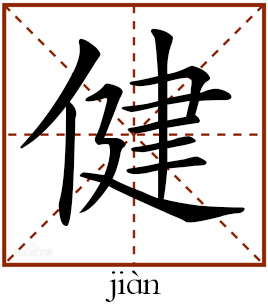Health

When used as an adjective, this character means “healthy, strong, robust or vigorous.” When used as a verb, this character means “to make something work better” or “to be good at.”
天行健,君子以自强不息
tiān xíng jiàn, jūn zǐ yǐ zì qiáng bù xí
Tian refers to Heaven and xing “to move or operate.” Jian means “constantly and vigorously.” In traditional culture, junzi represents a person who cultivates virtue to reach one’s full potential. Zi qiang bu xi is an idiom, known as “striving continuously to strengthen oneself.”
This term originated from the oldest of the Chinese classics, the Yi Jing (Book of Changes), giving a vivid account of junzi—“heaven moves constantly, likewise, the superior man makes untiring efforts to strengthen himself; The attitude of earth is receptivity. Thus do leaders support people with rich virtue.” Those words display the great refinement of the Chinese spirit, conveying the general goodness of junzi.
The ancient Chinese believed that celestial bodies move in accordance with their own nature in a vigorous and forever advancing cycle; thus the movement of “the unwearied sun from day to day” was a good symbol of ever-renewing, untiring effort. Junzi, who follow the law of heaven, should be fully motivated and work diligently to strengthen themselves. This is the Chinese view on self-improvement, established with reference to the movement of celestial bodies.
In traditional beliefs, the earth is generous and peaceful, because it sustains all things in the world, allowing them to grow and develop in keeping with their own nature. Junzi also model themselves on the earth, being broad-minded and caring for all creatures. They embody the pursuit of moral cultivation and harmony among humans and between human and nature. Together with the notion of constantly working toward self-improvement, this forms the fundamental character of junzi.
Confucianism has influenced Chinese culture for more than two millennia. There is a view that interprets Confucianism simply as the philosophy of being junzi, which is indeed tenable. It holds that being junzi consists of two aspects: self-cultivation and moral leadership.
edited by REN GUANHONG
